You just installed your brand new GE or Whirlpool water softener and you can’t wait to have all the benefits of soft water. You want to make sure that you take great care of your new water softener and use the best type of salt in it, but what is the best salt to use in your GE/Whirlpool water softener?
As a general rule, it is recommended to use Pellet, Nugget, (large crystal) Solar salt, or Potassium chloride (KCl) in a GE/Whirlpool water softener. The salt should be at least 99.5% pure for the best water softening performance. Avoid any salt that is NOT designed to be used in a water softener.
You can use most types of water softener salt in a GE/Whirlpool water softener but they are not all the same. Iron in your water, water usage, and whether or not you consume your softened water may determine which type of salt is best for you.
Recommended Salts To Use In GE/Whirlpool Water Softener.
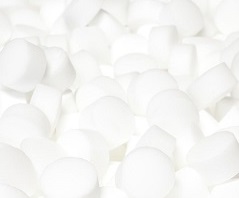
Pellet Salt:
- Very clean salt that can be used in most water softeners but contains a binding agent that can settle to the bottom of your brine tank.
- Commonly found in many hardware stores in a yellow, yellow/white bag. Also with an iron remover in a green, green/white bag.
- Often slightly more expensive than solar crystal salt but worth the expense if you want very clean salt.
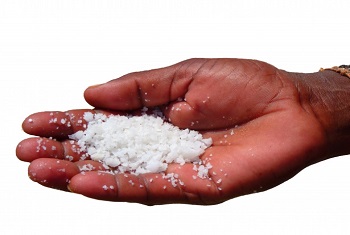
Solar Crystal Salt:
- Very pure salt which makes it more efficient than pellet salt but it may contain dirt and debris that may settle to the bottom of your brine tank or get drawn into your water softener valve.
- Commonly found in many hardware stores in a blue or blue and white bag.
- Usually, the least expensive salt to use in your water softener and is recommended for most electric water softeners.
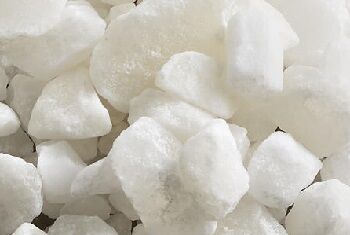
Potassium chloride (KCl):
- A low sodium alternative to pellet or solar salt.
- Will work fine in most water softeners but is often considerably more expensive than standard pellet or solar salts.
Are Some Salts Better Than Others For A GE/Whirlpool Water Softener?
I don’t consider some water softener salts to be better or worse than others for GE/Whirlpool water softeners, but they are different.
In most cases, using Solar Crystals or Pellet salt will work perfectly fine in a GE/Whirlpool water softener and they are both readily available.
While Pellet salt is usually purer than Solar Crystal salt, it is actually less efficient than Solar Crystal salt because the binder that is used to hold the salt in its pellet shape does not dissolve in water and ends up settling to the bottom of the brine tank.
Solar Crystal salt does not contain a binder, but it may contain small amounts of dirt and debris that will be left behind and will settle to the bottom of the brine tank.
While both Pellet and Solar Crystal salt will leave material behind in the brine tank, the dirt and debris left behind by Solar Crystal salt are usually easier to remove from the brine tank than the fine binding agent used in Pellet salt.
This is because the binder used is very fine and when it settles at the bottom of the brine tank, it becomes very compact, similar to cement.
This makes it very hard and difficult to remove, while dirt and debris left behind by Solar Crystal salt can easily be removed with a wet/dry vacuum or by simply scooping the majority of it out.
Potassium chloride (KCl) can be used in a GE/Whirlpool water softener when high sodium in the water is a concern.
Potassium chloride (KCl) will work the same as sodium-based salts in a GE/Whirlpool water softener, but it can leave a mushy build-up at the bottom of your brine tank and is usually considerably more expensive than Pellet or Solar Crystal salt.
Should I Use Solar Salt In My GE/Whirlpool Water Softener?

For the most part, using Solar Salt crystals is a good way to go for a GE/Whirlpool water softener.
Solar Salt crystals are very efficient, meaning that nearly the whole salt crystal will be dissolved and used to regenerate the water softener resin in your water softener.
Solar Salt crystals are readily available in most hardware stores, big box stores, grocery stores, and you can even buy Solar Salt online but the shipping can be a bit expensive.
You will also find that Solar water softener salt tends to be less expensive than Pellet salt. So unless you prefer using Pellet salt, you might as well save some money and stick with Solar Salt.
I recommend using Solar Salt crystals when there is a high soft water demand.
If you are going to be going through a lot of water softener salt in order to provide enough softened water for your demand, Solar salt will save you money and be more efficient than other water softener salts.
When should I Use Pellet Salt In My GE/Whirlpool Water Softener?

Pellet-type water softener salt is a very clean and pure choice to use in your GE/Whirlpool water softener.
If you don’t like the idea of having very small amounts of dirt or debris in your water softener salt that may be found in water softener Crystal salt, Pellet salt would be a great choice.
Pellet salt is made by binding very fine salt crystals into a Pellet shape. This means that there are very few impurities in the Pellet salt that could get drawn into your water softener or even into your home.
Chances are quite small that any dirt or debris from any water softener salt will get through to your home, but if your water already contains some sediment, you may want to use Pellet salt to prevent adding any more impurities to your water.
One disadvantage to using Pellet water softener salt is that it tends to be a little more expensive than salt crystals, and the binding agent that is used to hold the salt into the pellet shape does not dissolve in water and can build up on the bottom of your brine tank.
If your water softener is in a warm and humid area, Pellet salt can be more likely to cause salt bridging.
The larger-sized pieces of salt make Pellet salt more likely to lodge together or adhere to surfaces which can lead to a salt bridge.
Can I Use Potassium Chloride (KCl) In My GE/Whirlpool Water Softener?
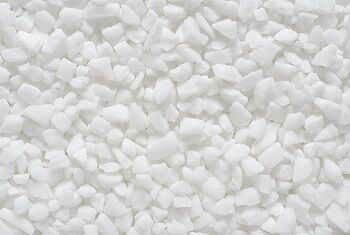
Potassium Chloride (KCI) is an alternative to sodium-based water softener salt that is not as efficient as simply salt crystals and it can be as much as four times the price of regular water softener salts.
People that are on low sodium diets may want to use Potassium Chloride to prevent any additional sodium from being added to their drinking water.
You can use Potassium Chloride in your GE/Whirlpool water softener without making any significant changes in your water softener programming providing that your water hardness is low to moderate.
In situations where dissolved iron is present in your water or you have high levels of hardness in your water, you may have to adjust your water softener settings if you want to change from water softener crystal salt to Potassium Chloride.
See your GE/Whirlpool owners manual or contact your local water softener professional to determine if you need to make any changes to your water softener for Potassium Chloride.
Should I Use Salt With Iron Removal Additives In My GE/Whirlpool Water Softener?
If you have ever been shopping for water softener salt, you probably have seen different colored water softener salt bags that say things like “Iron Removal” “Deep Cleaning” or similar phrases.
These water softener salts have additives in them that are designed to help remove dissolved iron from your water and to regenerate your water softener resin more thoroughly.
I rarely recommend using any of these water softener salts in your GE/Whirlpool water softener.
A properly working GE/Whirlpool water softener will remove moderate amounts of dissolved iron from your water without any additional help at all.
Water softener resin removes low to moderate amounts of dissolved iron from your water providing that the resin has not been damaged and the water softener is set correctly to accommodate the dissolved iron in your water.
Are Salts With Cleaning Additives Good For My GE/Whirlpool Water Softener?
Water softener resin cleaning additives in salts are generally not needed because the sodium in the salt itself is what is used to regenerate the water softener resin.
If you would like to give your water softener a deep cleaning occasionally, simply add a water softener sanitizer every 6 months to a year to help keep your water softener resin working at its best.
Can I Mix Salt Types In A GE/Whirlpool Water Softener?
As a rule, you should not mix different water softener salts in your brine tank. If you choose to change salt types or need to use a different form of salt than you have been using, let the existing salt level drop to near empty before adding the new form of salt.
Letting the existing water softener salt get nearly used up before changing over to a new form of salt will help prevent salt bridging.
There is no need to remove the existing salt from your GE/Whirlpool water softener before adding a new form of salt, but I do recommend that you let most of the existing salt get used before starting to use the new type of salt.
Which Type Of Water Softener Salt Is Best To Prevent Bridging.
I have found that evaporated Solar salt is least likely to cause bridging in most water softeners including GE/Whirlpool water softeners.
Because bridging in a water softener brine tank often starts in the corners of the tank or on the brine float tube, larger-sized pieces of salt are more likely to lodge in corners or on surfaces to create the beginning of a salt bridge.
Check for the start of a salt bridge in the corners of the brine tank on the rear sides, top and sides of the brine float tube, and even on the brine line coming from the brine tube.
What Are The Purest Salts To Use In A GE/Whirlpool Water Softener?
Evaporated Solar Salt is a very pure form of water softener salt. It has very few impurities in it and it can still be found at a fair price.
Pellet water softener salt is commonly recommended for GE/Whirlpool water softeners because of its purity and availability. (source)
Although using Solar Salt or Pellet salts are very commonly recommended for GE/Whirlpool water softeners, nearly all “Water Softener Salts” will work just fine.
What Salts Should I NOT Use In A GE/Whirlpool Water Softener?
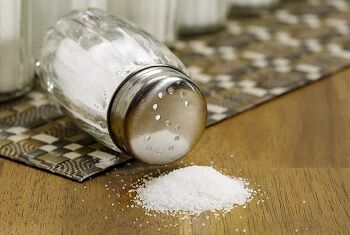
Rock salt and some off-brand water softener salts may contain more impurities than recommended for a GE/Whirlpool water softener so I recommend sticking to well-known major brands of water softener salts that will tend to be purer than other brands of water softener salt.
Although you could use non-water softener salts like table salt, swimming pool salt, or pure ice melting salts in your water softener in a pinch, be sure to check for and remove any dirt and debris in the salt before adding it to your GE/Whirlpool water softener.
If your water softener runs out of salt, I advise that you wait to get the correct “Water Softener” salt for your GE/Whirlpool water softener rather than adding a salt that could damage your water softener.
To Sum Up!
Ge/Whirlpool recommends that you use a very pure Nugget, Pellet, or coarse Solar salt in your water softener. (source)
Most water softener salts found in hardware, big box, and grocery stores will work fine in your GE/Whirlpool water softener and you should try to stick to the same form of salt when purchasing salt.
If your water softener runs out of salt, don’t panic and purchase a low-quality salt that may cause harm to your water softener. Try the next store to find the correct type of salt to be used in your water softener.

Very useful info and easy to understand.
Thank you,
Miryam
2/19/23